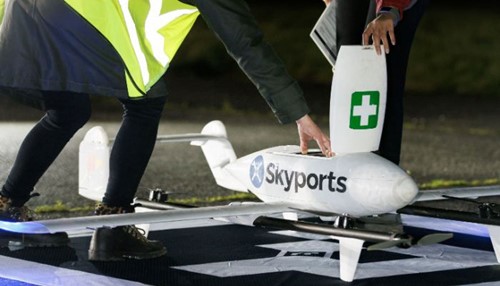
The prospect of remotely piloted drones operating in and out of some of the UK’s busiest airports has taken a step closer to reality following a series of pioneering simulations by Project CAELUS and the air traffic management service, NATS.
The simulations, run at NATS’ head office in Hampshire, demonstrated how drones could be seamlessly integrated alongside other air traffic at a busy airport. This included drone operators filing flight plans, flying in and out of the airport and being safely deconflicted with other aircraft.
The leading work forms part of Project CAELUS, a UKRI industry collaboration of 16 partners including AGS Airports, University of Strathclyde, NATS and NHS Scotland, aiming to use drones to transport essential medical supplies throughout Scotland.
The project’s first test flight occurred at Glasgow Airport last year, with a drone flying to the nearby NHS Golden Jubilee hospital. The concept development and simulation work NATS has led on is essential to understanding how that one-off flight could be safely scaled up to include dozens of drones flying ‘Beyond Visual Line of Sight’ and delivering medicines and blood tests to patients across Scotland and potentially beyond.
The airspace integration was overseen by a new Airspace Manager function using new technology developed by NATS. As part of this proposed ‘concept of operations,’ direct voice communication between a drone operator and air traffic control would only be required by exception – including the kind of emergency scenario demonstrated during the simulations.
Richard Ellis, NATS New Airspace Users Director, said: “Everything we’re doing is striving towards enabling the seamless, safe integration of drones and other new airspace users into our skies. There is a lot of work still to do, including the development and approval of new technology and regulations, but I believe what we and our Project CAELUS partners are doing will help support that process and is taking us a step closer to an exciting future.”
Fiona Smith, AGS Airports Group Head of Aerodrome Strategy and Project CAELUS Director, said: “We have continued to see some valuable collaboration and innovation across Project CAELUS and this latest work led by NATS truly demonstrates our ambition to forge a new path.”
“Our first live flight trial last year was incredibly important and demonstrated a means of integrating drones into an airport environment.”
“This year, we look forward to showcasing many more demonstrations including a ramped up flying programme across Scotland and we are delighted to kick start that programme with this exciting NATS showcase”.
Hazel Dempsey, Caelus National Programme Manager from NHS Grampian added: “Exploring how drone technology could be usefully used as a way of delivering care to people who live in urban, remote, rural and island locations, is edging ever-closer to a reality.”
Project Caelus is a Future Flight Challenge programme jointly funded by UK Research and Innovation. Further test flights are planned for later this year.


